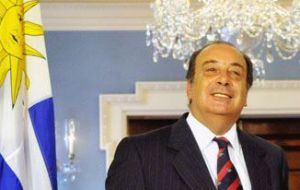MercoPress. South Atlantic News Agency
Surprise move: President Vazquez most trusted advisor Defence minister
 Gonzalo Fernandez, a “dream team” advisor in a devalued ministry
Gonzalo Fernandez, a “dream team” advisor in a devalued ministry With only two months left for Uruguay’s October general election President Tabare Vazquez, as had been anticipated, reshuffled his cabinet which included a major surprise: his main advisor and most trusted man was moved from Foreign Affairs to the ministry of Defence.
Gonzalo Fernández, an outstanding solicitor who in 2005 started as Executive Secretary, with his office next to President Vazquez’ and responsible for drafting all major legislation, and who later was moved to Foreign Affairs will as of this month occupy the Defence chair.
The decision comes as a surprise for several reasons according to local analysts: as the most trusted advisor of President Vazquez he has participated actively in all major decisions and among other things headed the investigation into the remains of human rights abuses’ victims form the time of the military dictatorship, 1973/1984.
This involved convincing military officers and personnel to come forward and give evidence of possible burial sites of disappeared prisoners or detainees from that time. The issue is still highly sensitive in Uruguay because since the amnesty laws of 1985, previous governments had a policy of not disturbing the past and it was the Vazquez administration which decided to open the vault.
The campaign was relatively successful: remains were found, --not all--, and some military officers and civilians were jailed and most victims or relatives compensated.
Fernandez was later moved to Foreign Affairs to contain the “radical” approach of the former minister, who happened to belong to the same Socialist party as Vazquez and the new minister, but who had a tendency to confuse ideology with Uruguay’s real interests.
The new minister presence in Foreign Affairs helped lead Uruguay back to its more traditional pragmatic approach between two regional big brothers (Brazil and Argentina), a more stable relation with Washington and less aligned with the region’s more populist regimes. “Closer to Brazil’s Lula da Silva and Chile’s Bachelet” was the apparent moving force.
But the big question is why Defence? Under the administration of President Vazquez, the Armed Forces budget has been drastically pruned; officers with links to the dictatorship of the seventies retired and replaced by new professional generations and the stalwarts of that period, including a former General and president jailed.
The significance of Defence for the Vazquez administration can be measured by the first appointee who lasted almost three years, Asuzena Berrutti, a human rights solicitor, in her late seventies whose scarce merits include having worked in Vazquez ministerial team when he was the mayor of Montevideo, plus her insistence that tea be served at five o’clock sharp.
She was replaced by another obscure elected bureaucrat from a junior partner of the ruling catch-all coalition whose knowledge of military affairs can be tracked to some brief courses in the US Defence School of the Americas.
And now suddenly with only two months to a major election, so tight that the ruling coalition could loose in the November run off, and six months to handing the presidential stash to Vazquez successor, the most prominent and notorious of the presidential inner circle “dream team” of advisors ends in Defence.
A rest and recovery period until next March or Mr. Vazquez wants his most trusted and closest advisor in a post that must guarantee institutional continuity, whatever the results of the coming election.




Top Comments
Disclaimer & comment rulesCommenting for this story is now closed.
If you have a Facebook account, become a fan and comment on our Facebook Page!